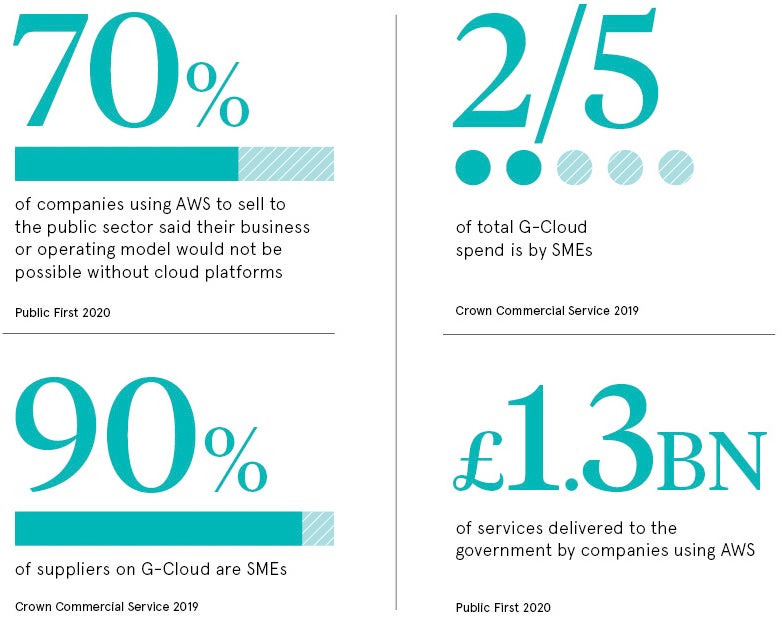
Once upon a time, it was difficult for smaller businesses to win public sector contracts to provide IT services, particularly for central government.
The biggest challenge was that many procurement officials believed getting volume discounts in one transaction was the best way to deliver value for taxpayers’ money. This may sound logical, but once supply is aggregating to a high-enough level, there are only a few suppliers that can come close to satisfying demand.
There have since been some major changes. Firstly, there has been a renewed focus from the government to work with small and medium-sized enterprises (SMEs) with more specialist knowledge to provide better value. Secondly, the government introduced its G-Cloud framework, an initiative aimed at changing the way suppliers and buyers of ICT services do business in the public sector.

About 90 per cent of suppliers on G-Cloud are SMEs, with a cumulative spend of £2 billion since G-Cloud’s launch in 2012, or two fifths of the total G-Cloud spend to date.
Simultaneously, the development of cloud computing has been embraced within government, enabling departments not only to benefit from products available from major companies, but also low-cost, niche products from cloud-supported SMEs that can provide support and solutions.
Using the cloud to sell to the public sector
“Unlike the traditional outsourcers, Amazon Web Services (AWS) and cloud computing companies are creating opportunities for SMEs through their advanced and trusted partner networks,” says Denis Kaminskiy, co-founder and director of Arcus Global, which builds cloud-based products for the public sector.
Arcus Global is one of the more than 150 companies that have used AWS to help them deliver services, worth more than £1.3 billion, to the government, with over half of these companies categorised as SMEs at the time of delivery.
In fact, cloud computing has been essential for many of these businesses. According to a Public First survey, 70 per cent of companies using AWS to sell to the public sector said their business or operating model would not be possible without cloud platforms.
“Before cloud technology became mainstream, it would be difficult to tender for larger public sector contracts for a variety of reasons. Without the economies of scale available to larger firms, and fewer personnel to assist, it becomes a difficult task to acquire, set up and maintain the variety and depth of hardware required to support the needs of government business,” says Marc Whittingham, technical director of Blue Frontier.
According to Whittingham, the public cloud has changed this perception, providing a level playing field for all businesses to be able to access a huge variety of resources to cater for just about any requirement.
Before cloud technology became mainstream, it would be difficult to tender for larger public sector contracts
“As a result, smaller businesses are able to propose for larger contracts as a large portion of the underlying ‘leg work’ has been taken care of by the cloud vendor. This in turn allows businesses to focus on adding value to their offering by utilising their current expertise without having to focus on babysitting a vast array of physical infrastructure,” he says.
How the cloud adds credibility and security
Whittingham says there are added benefits for a supplier being on G-Cloud and using cloud computing. G-Cloud acts as a badge of credibility so when public sector bodies shop around for IT companies, smaller firms can benefit as they may not need to pitch for contracts and have been approached by local government because of their inclusion on the framework.
Cloud computing provides a clear separation of roles and responsibilities when it comes to security, which is an important part of public sector procurement.
“By following best practice and utilising pre-hardened environments, smaller firms can pitch for work where previously they may have been frozen out due to a lack of internal security knowledge or the ability to provide resources dedicated to security and monitoring environments,” says Whittingham.
A new way of looking at SMEs
Crucially, public sector bodies will learn to trust SMEs more as they see results. Elena White, business systems manager at the Isle of Anglesey County Council, says using Arcus Global’s cloud-based planning and building control system has reduced administrative efforts and enabled her team to share, digest and use data more easily. Restrictions on daily work because of the pandemic have been a good test of the system.
“We’ve been working from home for the past 18 weeks and our platforms have been working perfectly, showing our employees they can carry on as normal without being in the office. It just goes to show what a difference being cloud based makes,” White concludes.

Once upon a time, it was difficult for smaller businesses to win public sector contracts to provide IT services, particularly for central government.
The biggest challenge was that many procurement officials believed getting volume discounts in one transaction was the best way to deliver value for taxpayers’ money. This may sound logical, but once supply is aggregating to a high-enough level, there are only a few suppliers that can come close to satisfying demand.
